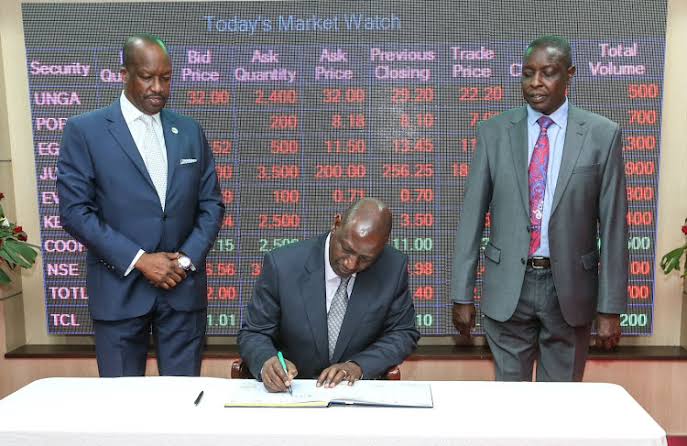Nearly half of all foreign investors took off from Kenya’s stock market, the Nairobi Securities Exchange. Data shows that in the nine month period to September 2023, 6,256 foreign investors fled the NSE.
This number is the equivalent of about 42 per cent of all foreign investors at the Nairobi Securities Exchange. Their exit had aggravated the bear run at the NSE, with market capitalization hitting an 11-year-low of Sh. 1.3 trillion as at the end of October 2023.
In the month of September alone, foreign investors sold of shares worth Sh. 1.1 billion. This was the continuation of a trend of net sell offs by foreign investors that has dominated the year, leave for the months of June and August when foreign investors were net buyers.
From January 2023 to October 2023, foreign investors dumped shares worth Sh. 18.7 billion at the NSE. The biggest sell off was in the month of March 2023 when these investors sold off shares worth Sh. 10.6 billion.
These huge sell offs were also singled out as the reason for the continued deterioration of the local market whose 20-Share Index lost 9.9 per cent between October 2022 and October 2023. At the same time, the All Share Index lost 25.2 per cent in the period between October 2022 and October 2023.
The deterioration of the local market comes less than a month after a Bloomberg report ranked Kenya’s stock market as the worst in the world.
“NSE’s all-share index posted the fourth consecutive quarter of decline in September, the longest stretch since 2017,” the Bloomberg has reported. “So far this year, Kenya’s stock benchmark has lost a quarter of its value, marking the worst performance among country indexes tracked by Bloomberg.”
An analyst told Bloomberg that the NSE would continue to take a hit. “We expect the equities market to take a hit especially given the rising interest rates environment that we’re in. We just expect to see net outflows,” the analyst, Wesley Manambo, a senior associate for research at Nairobi-based Standard Investment Bank Ltd, said.
Bloomberg highlighted the case of KCB Group Plc whose stock has been one of the hardest hit.
“Bad loans at the bank have hurt investor confidence. Kenya’s debt burden has also become a focal point for investors as the country faces skyrocketing energy and food import bills, as well as low foreign-exchange reserves,” said Bloomberg.
However, the NSE has been defensive on its performance, and in October said Bloomberg’s assessment and claim that it was one of the worst markets was inaccurate.
The securities exchange argued that the global news outlet did not offer a holistic view of Kenya’s public capital markets.
Daniel Kung’u: Why I switched from saving in bank to saving in Sacco
They pointed out that Bloomberg’s assessment did not take into consideration important factors such as float adjustments, dividend yields, and comparisons with peer group markets. Such factors are heavily weighed by investors when making decisions in the market.











